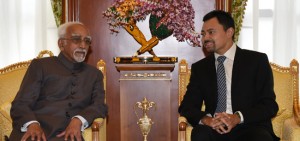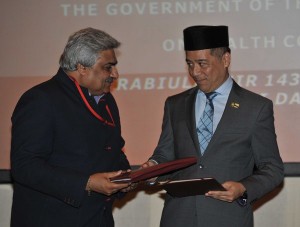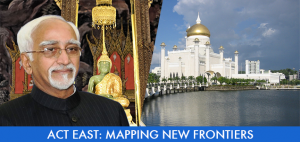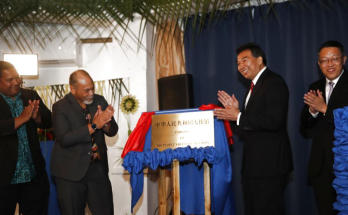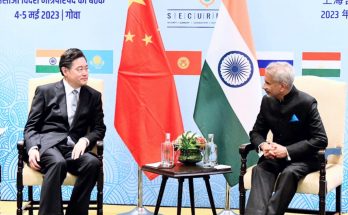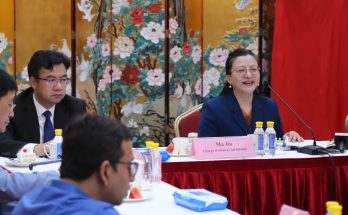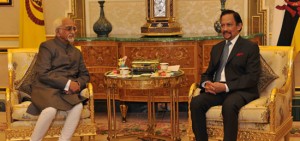
BANDAR SERI BEGAWAN: The first vice-presidential visit from India to Brunei has culminated in a template for transforming ties between the two nations, with the energy-rich Southeast Asian country signing a defence pact and pushing for a bigger role for India in ASEAN and the extended region.
The joint plan to impart a strategic dimension to bilateral relations was telescoped in the signing of an important defence cooperation pact, which envisages, among other things, an intensification of joint military exercises and closer cooperation between the defence industries of the two countries.
The pact was signed after delegation-level talks between India’s Vice-President Hamid Ansari and Brunei’s Crown Prince Haji Al-Muhtadee Billah at the majestic Empire Hotel in Bandar Seri Begawan, the leafy green capital of Brunei, on February 2. Two other pacts on promoting health cooperation and spurring sports and youth exchanges were also signed after the traditional Muslim prayers.
Betting on India: Brunei upbeat
The signing of these pacts is set to infuse a new energy in India’s relations with Brunei, which had not loomed large on the country’s diplomatic horizon except in the context of around $1 billion oil imports. What’s more important is a visible enthusiasm on part of Brunei’s rulers about bolstering strategic and economic ties with Asia’s second largest economy, which is increasingly being seen by ASEAN as an emerging power of promise and a balancer in the region.
In his interactions with Mr Ansari, Brunei’s Sultan Haji Hassanal Bolkiah and Crown Prince, the two most powerful men in the sultanate of Brunei, praised the 11,000-strong Indian community for their hard work and excellence and conveyed the desire to deepen and diversify ties with New Delhi.
“Brunei wants to expand relations with India. They are all praise for Indian professionals, doctors and teachers,” said Mr Anil Wadhwa, Secretary (East) and India’s seniormost official dealing with the region.
South China Sea: On the same page
The signing of the defence pact is significant coming as it does amid the flux in the region and festering territorial disputes around South China Sea. With China launching a massive outreach to ASEAN countries, this important step by India signals a more proactive India standing up vigorously for freedom of navigation and defence of global maritime commons. Not surprisingly, South China Sea, which has seen a fresh sparring match between the US and China and increasingly assertive stance by countries like Vietnam, figured prominently in discussions, with the two sides advocating the primacy of international law in resolving the dispute peacefully through dialogue. “Both sides are on the same page (on South China Sea). The issue should be resolved peacefully through dialogue and by adopting code of conduct,” Mr Wadhwa said.
“Brunei supports current negotiations on a Code of Conduct. They (Brunei) feel that the issue should not be internationalised beyond a point,” said Mr Wadhwa. Unlike other claimants to parts or whole of South China Sea like Vietnam and the Philippines, Brunei has maintained a more moderate posture and reposed faith in the powers of diplomacy to resolve this long-standing dispute.
Against the backdrop of proliferating terror syndicates across West Asia, South Asia and Southeast Asia with incestuous linkages, the two sides also explored prospects of deepening counter-terror cooperation. The discussions focused on misuse of IT and internet for terrorism through attempts at online radicalization by extremist groups.
Besides strategic and trans-national issues, India and Brunei also explored modalities to intensify and diversify their economic cooperation that has been dominated by hydrocarbons. With oil prices plunging to an all-time low, Brunei, which depends on hydrocarbons for more than 90 per cent of its revenues, has been hit badly like other oil-importing countries, and is looking to rope in India as an important partner in its bid to diversify its economy. In this context, the two sides discussed a plan by India to set up a production facility for fertilisers in Brunei by making use of local gas, which will export urea and fertilisers to India. The success of the joint venture in Oman has set a robust precedent for such a project to go ahead. An investment delegation from India would be visiting Brunei soon to explore this proposal, Mr Wadhwa said.
Asian Century: Weaving India-ASEAN win-win web
The net takeaway of the vice-president’s visit to Brunei is a reinvigoration of strategic and economic ties with Brunei, and placing this relationship in the larger context of the centrality of ASEAN as a driver of the ongoing Asian resurgence. With this trip by Mr Ansari to Brunei, India’s prime minister, president, vice-president and foreign minister between them would have visited all ASEAN countries except the Philippines. One can expect India’s Act East policy to acquire more depth and content in days to come, as Mr Ansari has said.
Alluding to the upgrade of India-Brunei relations and the metamorphosis of New Delhi’s Look East policy into Act East policy under the Narendra Modi government, Mr Ansari underlined that the coming months will see a greater economic integration and cultural familiarity between India and ASEAN countries. He linked up the Act East policy with the promise of an unfolding Asian century. India and Brunei have been neighbours for centuries. “As part of Act East policy, a great deal of activity is underway. This will bring India and Brunei closer and Inia and ASEAN closer,” the vice-president said at a reception for the Indian community after the talks.
(Manish Chand is Editor-in-Chief of India Writes Network, www.indiawrites.org, a portal and e-magazine focused on international affairs and the India Story. He is part of the media delegation accompanying Vice-President Hamid Ansari to Brunei and Thailand)
Author Profile

- Manish Chand is Founder-CEO and Editor-in-Chief of India Writes Network (www.indiawrites.org) and India and World, a pioneering magazine focused on international affairs. He is CEO/Director of TGII Media Private Limited, an India-based media, publishing, research and consultancy company.
Latest entries
 India and the WorldMarch 3, 2024India-Denmark Connect: Red carpet for Indians to Red Sea cooperation
India and the WorldMarch 3, 2024India-Denmark Connect: Red carpet for Indians to Red Sea cooperation India and the WorldFebruary 17, 2024Munich Security Conference: Jaishankar, Blinken focus on Red Sea, Middle East
India and the WorldFebruary 17, 2024Munich Security Conference: Jaishankar, Blinken focus on Red Sea, Middle East India and the WorldFebruary 14, 2024Munich Security Conference report: Migration, war top security threats
India and the WorldFebruary 14, 2024Munich Security Conference report: Migration, war top security threats India and the WorldJanuary 23, 2024With “Ram to Rashtra” mantra, Modi consecrates Ram temple for national renewal
India and the WorldJanuary 23, 2024With “Ram to Rashtra” mantra, Modi consecrates Ram temple for national renewal

